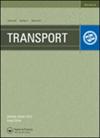客流对智能公交出行服务模型的动态影响研究
IF 1.3
4区 工程技术
Q3 TRANSPORTATION SCIENCE & TECHNOLOGY
引用次数: 1
摘要
为了提高公交出行服务的服务质量和便利性,本文提出了智能公交出行服务模型(IBTSM)。IBTSM可以提供一个考虑公共汽车旅行各个方面的旅行策略,特别是考虑由于公共汽车承载能力有限而引起的高峰时段延误。为了实现IBTSM,执行了一个三步方法。首先,利用长短期记忆(LSTM)预测公交行驶时间。其次,利用模糊专家系统对公交拥挤程度进行评价,在此基础上规划合理的出发时间,避免客流过大造成的延误;采用k-最近邻算法(k-NN)提供客流输入数据。在本研究中,研究客流变化与公交服务之间的相关性,将出行策略的规定扩展到包括出发时间调度和目标公交选择,而不仅仅是公交运行时间估计。以中国某客车为例,对该模型进行了评估,验证了该模型的可靠性以及对提升客车服务质量和发展智能出行的积极影响。本文章由计算机程序翻译,如有差异,请以英文原文为准。
STUDY ON DYNAMIC INFLUENCE OF PASSENGER FLOW ON INTELLIGENT BUS TRAVEL SERVICE MODEL
To improve the service quality and convenience of bus travel services, this paper proposes the Intelligent Bus Travel Service Model (IBTSM). The IBTSM makes it possible to provide a travel strategy considering every aspect of bus travel, specifically, delay in the peak period arising from limited carrying-capacities of buses. A three-step approach was executed toward implementing the IBTSM. First, the bus travel-time was predicted using Long Short-Term Memory (LSTM). Next, the crowding level in the bus was evaluated using a fuzzy expert system, based on which a reasonable start-off time was planned, and the delay caused by large passenger flow was circumvented. The k-Nearest Neighbours (k-NN) algorithm was used to provide input data of passenger flow. In this study, the correlation between passenger flow variation and bus services was investigated to extend the provisions of the travel strategy to include start-off time scheduling and target bus selection, rather than only bus running-time estimation. The proposed model was evaluated using a bus in China as a case study, and its reliability and positive impact on promoting both the quality of bus services and development of intelligent travel were demonstrated.
求助全文
通过发布文献求助,成功后即可免费获取论文全文。
去求助
来源期刊

Transport
Engineering-Mechanical Engineering
CiteScore
3.40
自引率
5.90%
发文量
19
审稿时长
4 months
期刊介绍:
At present, transport is one of the key branches playing a crucial role in the development of economy. Reliable and properly organized transport services are required for a professional performance of industry, construction and agriculture. The public mood and efficiency of work also largely depend on the valuable functions of a carefully chosen transport system. A steady increase in transportation is accompanied by growing demands for a higher quality of transport services and optimum efficiency of transport performance. Currently, joint efforts taken by the transport experts and governing institutions of the country are required to develop and enhance the performance of the national transport system conducting theoretical and empirical research.
TRANSPORT is an international peer-reviewed journal covering main aspects of transport and providing a source of information for the engineer and the applied scientist.
The journal TRANSPORT publishes articles in the fields of:
transport policy;
fundamentals of the transport system;
technology for carrying passengers and freight using road, railway, inland waterways, sea and air transport;
technology for multimodal transportation and logistics;
loading technology;
roads, railways;
airports, ports, transport terminals;
traffic safety and environment protection;
design, manufacture and exploitation of motor vehicles;
pipeline transport;
transport energetics;
fuels, lubricants and maintenance materials;
teamwork of customs and transport;
transport information technologies;
transport economics and management;
transport standards;
transport educology and history, etc.
 求助内容:
求助内容: 应助结果提醒方式:
应助结果提醒方式:


